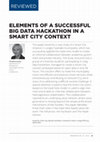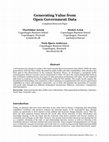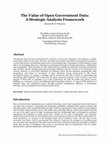Papers by Thorhildur Jetzek

This paper presents a case study of a Smart City initiative in Lyngby-Taarbæk municipality, which... more This paper presents a case study of a Smart City initiative in Lyngby-Taarbæk municipality, which has successfully applied the triple helix model to create an informal collaboration between academia, government and private industry. The study recounts how a group of university students, participating in a big data hackathon, managed to create a smart city solution prototype based on open data in only 48 hours. The solution offers to make the municipality more cost efficient and improve citizen services, while simultaneously contributing to reduced CO2 emissions, thus addressing a difficult societal challenge. A special attention is paid to how the smart city vision based on the triple helix model is used to align interests and enable an informal collaboration between heterogeneous stakeholders. This collaboration represents an underlying value network, where value generation is moving beyond the simple profit-driven mechanisms of the markets. The paper identifies three main roles in the triple helix based value network: The Influencer, the Facilitator and The Implementer

Current literature on open government data has uncovered a wide range of challenges related to th... more Current literature on open government data has uncovered a wide range of challenges related to these important initiatives. The problems encountered include: insufficient data quality and interoperability, problems regarding governance and motivation, lack of capabilities, and heterogeneous political and ideological agendas. A common open data infrastructure might resolve some of these problems, however, implementing such an infrastructure is a highly complex task. This longitudinal case study of the Danish Basic Data Program (BDP) is intended to improve our understanding of the challenges related to providing open access to government data through open data infrastructure. The BDP aims to improve the quality of selected government data, make them more coherent, and improve accessibility through the implementation of a common data distribution platform. The program is expected to increase government efficiency and stimulate innovation. This case study describes the evolution of the BDP and identifies the main structural elements of an open data infrastructure. Data analysis uncovered four tensions, which are identified as key challenges of an open data infrastructure implementation. These tensions are presented with four suggested governance strategies that were used in the BDP case. The main contribution of the paper is a process model where the main phases and mechanisms of an open data infrastructure implementation, use and impacts are identified and explained.

IFIP Advances in Information and Communication Technology, 2014
Our societies are in the midst of a paradigm shift that transforms hierarchal markets into an ope... more Our societies are in the midst of a paradigm shift that transforms hierarchal markets into an open and networked economy based on digital technology and information. In that context, open data is widely presumed to have a positive effect on social, environmental and economic value; however the evidence to that effect has remained scarce. Subsequently, we address the question how the use of open data can stimulate the generation of sustainable value. We argue that open data sharing and reuse can empower new ways of generating value in the sharing society. Moreover, we propose a model that describes how different mechanisms that take part within an open system generate sustainable value. These mechanisms are enabled by a number of contextual factors that provide individuals with the motivation, opportunity and ability to generate sustainable value.
Our societies are in the midst of a paradigm shift that transforms hierarchal markets into an ope... more Our societies are in the midst of a paradigm shift that transforms hierarchal markets into an open and networked economy based on digital technology and information. In that context, open data is widely presumed to have a positive effect on social, environmental and economic value; however the evidence to that effect has remained scarce. Subsequently, we address the question how the use of open data can stimulate the generation of sustainable value. We argue that open data sharing and reuse can empower new ways of generating value in the sharing society. Moreover, we propose a model that describes how different mechanisms that take part within an open system generate sustainable value. These mechanisms are enabled by a number of contextual factors that provide individuals with the motivation, opportunity and ability to generate sustainable value.

A driving force for change in society is the trend towards Open Government Data (OGD). While the ... more A driving force for change in society is the trend towards Open Government Data (OGD). While the value generated by OGD has been widely discussed by public bodies and other stakeholders, little attention has been paid to this phenomenon in the academic literature. Hence, we developed a conceptual model portraying how data as a resource can be transformed to value. We show the causal relationships between four contextual, enabling factors, four types of value generation mechanisms and value. We use empirical data from 61 countries to test these relationships, using the PLS method. The results mostly support the hypothesized relationships. Our conclusion is that if openness is complemented with resource governance, capabilities in society and technical connectivity, use of OGD will stimulate the generation of economic and social value through four different archetypical mechanisms: Efficiency, Innovation, Transparency and Participation.

The exponentially growing production of data enables global connectivity as well as increased ope... more The exponentially growing production of data enables global connectivity as well as increased openness and sharing, which turn into a powerful force that is changing the global economy and society. Governments around the world have become active participants in this evolution by opening up their data for access and re-use by public and private agents alike. The recent phenomenon of Open Government Data (OGD) has spread around the world, driven by the proposition that opening government data has the ability to generate both economic and social value. However, a review of the academic research and the popular press reveals only sporadic attention given to various aspects with no overarching framework that explains how OGD generates value. We apply a critical realist approach to uncover the generative mechanisms that serve to explain this relationship. First, we present a strategic framework with four archetypical generative mechanisms. The framework outlines the different pathways to value generation and highlights the current tension between the private/public and economic/social domains. Second, we offer a conceptual model that provides a systematic way of articulating and examining further the generation of value from OGD.

Government data has been accumulated for centuries in protected repositories and registries as pu... more Government data has been accumulated for centuries in protected repositories and registries as public record and a matter of civil order. Recently, the Open Government Data (OGD) movement has emerged as a group that focuses on facilitating open access to government data. Proponents of OGD initiatives argue that it can strengthen democracy and improve government through increased participation, collaboration and transparency. OGD advocates are also motivated by its potential contribution to greater productivity and economic growth through increased government efficiency and the creation of new businesses and services. However, as most OGD initiatives are relatively recent, the key questions regarding the value propositions and return on investment of these initiatives remain unanswered. In this theory development paper, we propose a strategic options framework that offers criteria for generating and prioritizing OGD initiatives. The framework can guide structured analysis of the economic and social impacts of OGD with an emphasis on its value propositions for both the public and private sectors. Building on a literature review and fieldwork-based anecdotal evidence, we expect OGD initiatives to generate value and substantial returns through increased transparency, efficiency of government activities, citizen participation and entrepreneurial activity.
iris.im.uu.se
In the recent years, governments around the world have been focusing on the value of public secto... more In the recent years, governments around the world have been focusing on the value of public sector information (PSI). Research has shown that open access to PSI can act as a driver of efficiency within the public sector and as a vehicle for increasing transparency, citizen participation and innovation in society (Koski 211;. The Danish Ministry of Finance has recently started a program consisting of a number of different projects with the common goal of enhancing access to public core data in order to increase public sector efficiency and effectiveness and foster innovation. This PhD study will examine how different social and technological elements in the complex environment of a PSI project can impact the project outcome, with the aim of identifying the drivers of innovation.
sedlabanki.is
Hér verða kynnt lauslega nokkur sparnaðarhugtök sem notuð verða svo að koma megi í veg fyrir miss... more Hér verða kynnt lauslega nokkur sparnaðarhugtök sem notuð verða svo að koma megi í veg fyrir misskilning við lestur greinarinnar. Fyrst er rétt að geta að hér er hugtakið sparnaður notað um nýtt sparifé, þ.e. sem flaeðistaerð, en orðið sparifé er notað um fjárstofninn. Víðasta sparnaðarhugtakið er þjóðhagslegur sparnaður eða heildarsparnaður þjóðarbúsins. Vergur þjóðhagslegur sparnaður er samkvaemt skilgreiningu verg þjóðarframleiðsla að frádreginni einkaneyslu og samneyslu eða samtala heildarfjárfestingar og viðskiptajafnaðar. Í þessum skilningi lýsir viðskiptajöfnuður flaeði erlends sparnaðar inn í landið eða innlends sparnaðar út úr landinu. Vergur þjóðhagslegur sparnaður er gerður upp eftir ráðstöfun raunverðmaeta og hann er því haegt að finna án nokkurrar vitneskju um lánakerfið.







Uploads
Papers by Thorhildur Jetzek